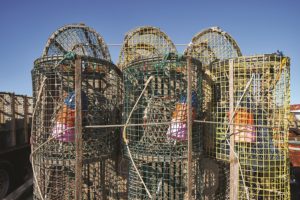This past week’s cooler weather has slowed down the striped bass migration a bit, as water temperatures have remained steady in the mid-40s, short of that 50-degree mark we need to really get things percolating. A few hold-over bass have been reported caught along the canal and on up towards the South Shore and Boston Harbor, and even a few keepers have come in. But the Outer Cape remains very quiet to date.
Mackerel are beginning to show in Cape Cod Bay, and that’s a good sign, as striped bass are usually right behind them. Mackerel are one of their major food sources.
I have not heard much on the flounder front. That is probably more a result of no one out there trying for them yet, as there haven’t been many days of good conditions for fishing lately. We’ve had a lot of wind this spring. Same goes for tautog fishing, but I suspect these fish are in the usual places and will be ready to bite once the weather gets more reasonable for being out there safely and comfortably. Keep in mind, if you head out in a boat, the water temperatures are still cold enough to be fatal if you are in the water for as little as 30 to 60 minutes.
The big news this week is the significantly higher than usual number of North American right whales currently in the area. There seems to have been a slight shift away from Herring Cove and Race Point, more to the north and west and out of sight of the naked eye from the beaches. This could indicate the beginning of a departure from our bay — or simply a shift to more plankton-rich areas in the bay. Whales, like fish, stay close to the most concentrated food sources.
An aerial survey conducted last week by the Provincetown Center for Coastal Studies documented approximately 160 right whales in Cape Cod Bay and along the Massachusetts South Shore. That represents almost half of the entire East Coast right whale population. Many of these whales were observed skim feeding on plankton along the water surface and slightly below the surface. This behavior has them so focused on feeding they become less aware of their peripheral environment, which, combined with their lack of agility, makes them susceptible to boat collisions.

Early whalers named them for their slow movements and high grade of oil, thus making them the “right” whale to catch. The good news for this highly endangered species is that 10 right whale mother-calf pairs have been seen in our area so far.
The bad news for lobstermen is this also means the advisory on trap gear closure in Massachusetts waters remains in effect through May 15. In some years, the trap gear closure was in effect only until April 30. This year the closure was extended and continues to include all waters north and east of Cape Cod.
The trap gear closure is designed to prevent endangered right whales from becoming entangled in the gear while present in our waters. Aerial surveys will continue, and if the right whales depart earlier than expected, both Cape Cod Bay speed limit restrictions and surrounding area trap gear restrictions can (and should) be amended.



